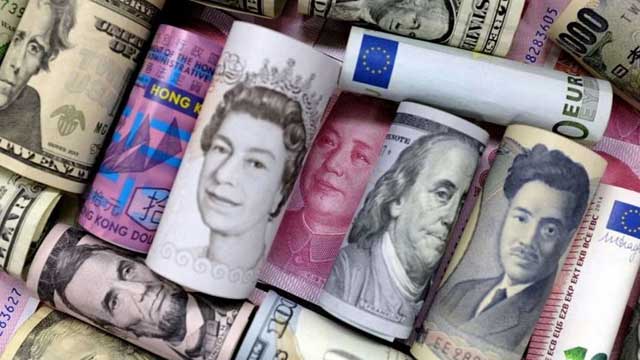supply chains disrupted by tight labour markets and the Ukraine war. Fundamentally, the global financial system is being split from a dollar-dominated system into one likely to be in blocs with different payment systems. The US dollar system will be dominant for a while, but the more the dollar is weaponised in terms of sanctions, the more users will want to de-dollarize. Global finance is seriously conflicted as to its real objectives – promote growth, control inflation or go fight the next war.
Basically, the top four central banks – the Fed, European Central Bank (ECB), Bank of Japan (BOJ) and People's Bank of China (PBC) together run the monetary policy for the world, as they operate the key reserve currencies. But clearly the Fed is heads and shoulders above the rest because of the dominant position of the US Dollar (USD), which accounts for 60% of global foreign exchange reserves and roughly half of global trade invoicing. The ECB has been expansionary, but the leading quantitative easing champion is BoJ, whose balance sheet is now 125% of Japanese GDP.
However, when the big three (Fed, ECB and BOJ) started on quantitative easing (QE) after the 2008 global financial crisis (GFC), their balance sheets increased six times from $4.6 trillion at end 2007 to $27.9 trillion at end 2020. Over this period, their total financial (central bank, banking and non-bank financial intermediary) assets dropped as a percentage of total G20 financial assets from 75.5% to 63.7%. In the meantime, slower growth of G3 meant also their GDP share of G20 GDP has dropped from 66.1% to 56.1 %.
When global inflation started to pick up in 2022, the Fed and the ECB started raising interest rates, with the BOJ still lagging behind. This caused the US dollar to strengthen as there was not just a flight to quality arising from rising geopolitical tensions, but also investors seeking higher returns as the rest of the central banks were slow to react on interest rates. This allowed most currencies to depreciate against the USD.
History has shown that when the USD is strong, world trade contracts and growth slows. American buying power increases, but the world has to contend with tighter liquidity. As one former US Treasury Secretary said, "our dollar, your problem." However, after the US became a net debtor to the world in 1990, her gross foreign liability rose to $53 trillion and net liability of $18 trillion at the end of 2021, any increase in US interest rates meant higher US debt burden and therefore contractionary on the economy. Today, it's our dollar, our global problem.
If you strip off the veil of money, you would discover that money and finance is like a shell game that hides what is happening in the real economy (namely all that matters, like jobs, food, health etc). Essentially, life is about reciprocity – if you owe someone, you have to pay back sooner or later in material goods, services or just making that person happy. You cannot be nasty to your banker or creditor, and vice versa.
So when the financial pundits say that the US dollar is so dominant that there is no alternative (TINA), they forget that the dollar is a two-edged sword for the United States. Yes, it's very powerful and can be weaponized, so that America can confiscate or sanction any dollar holders by monitoring the dollar payment system. And yes, in the short run, the dominant position means that it is very difficult to de-dollarize.
But, neocons in Washington tend to forget that they are recommending that the US fight world war three on a credit card. The US national debt is already at the same level (100% of GDP) as its peak at the end of World War Two. At the same time, every Afghani or Russian understands that holding more US dollars means that they are funding the next F35 jet that might bomb them to smithereens.
The geopolitical conclusion is that if the G3 central banks continue to ease monetary policy to continue supporting their financial system and rescue their economy from recession, then the implication is to weaken their currencies. If so, we may get a situation where everyone else may follow to devalue, so that a global race to devaluation will end up with stagnation and higher inflation.
Traditional central banking claims that inflation is essentially a monetary phenomenon. If you print more money than the growth of real goods, then inflation is inevitable. Furthermore, if you increase defense expenditure, which does not add to global productivity, then we end up weaponizing global money towards global conflict. In a nuclear war, all currencies and financial systems will be nuked. That is the ultimate de-dollarization.
Weaponizing the world's money is killing global public goods. If you want a brawl, please don't break the bar.
Andrew Sheng is a distinguished fellow of Asia Global Institute, University of Hong Kong, and chief adviser to the China Banking Regulatory Commission.
Copyright: Asia News Network





